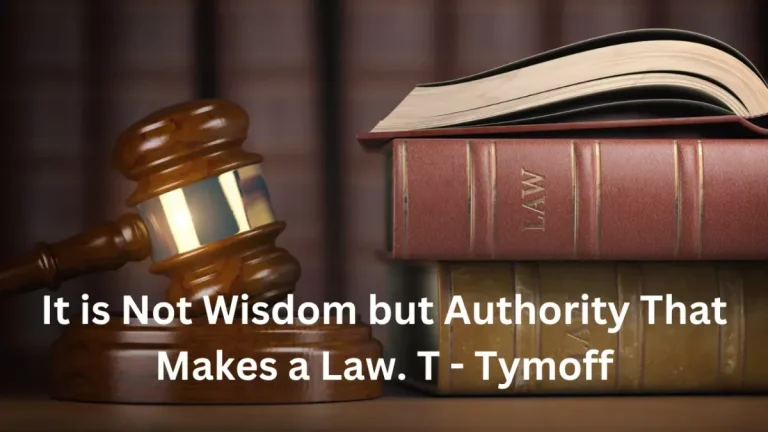The quote “It is not wisdom but authority that makes a law” by T. Tymoff invites us to reflect on the nature of law and governance. This statement challenges the conventional belief that laws are inherently rooted in justice or moral wisdom. Instead, it emphasizes that laws derive their legitimacy from the power and authority of those who create and enforce them. This perspective raises important questions about the relationship between authority, morality, and justice in society. Are laws just because those in power enact them, or can true justice exist independently of authority? As we explore this idea, we delve into the complexities of legal systems, the role of power in shaping societal norms, and the implications for individual rights and freedoms.
Understanding Authority in Law
Authority refers to the power or right to give orders, make decisions, and enforce obedience. In a legal context, authority is often vested in institutions—governments, legislatures, and judicial systems—that create and uphold laws. While these laws are ideally meant to reflect societal values and promote justice, the reality is that authority often shapes the legal landscape more than wisdom does.
- Legitimacy of Authority: Legal authority must be recognized by the populace to be effective. Citizens typically comply with laws not necessarily because they agree with them but because they recognize the authority of those who created them. This compliance is a key element in the stability of any legal system.
- Separation from Moral Wisdom: The authority that establishes laws does not inherently possess wisdom. Laws can be created based on political expediency, societal pressures, or even coercive measures. History is replete with examples of authority producing unjust or morally questionable laws. The Civil Rights Movement in the United States serves as a poignant reminder of laws that were upheld by authority yet were devoid of ethical wisdom.
What is Authority?
Authority refers to the individuals or institutions that implement rules and regulations within a society. This includes lawmakers, judges, and government officials, all of whom make decisions that significantly impact the lives of many people. Their roles involve creating new laws, enforcing existing regulations, and ensuring compliance among the public.
What is Wisdom?
Wisdom, on the other hand, involves making decisions based on knowledge and experience. It encompasses a sense of what is right and wrong for society, serving the interests of the community. The key distinction is that authority can enforce laws that are legal but not necessarily wise, while wisdom aims to guide public interest by considering the needs and experiences of the people.
Authority vs. Wisdom
Laws are crafted by those in power and enforced by authorities, regardless of public opinion. When government institutions make decisions, they often prioritize what they believe is best for the country as a whole, which may not align with the needs or desires of individual citizens. For example, a law may be enacted that serves national interests but fails to address the concerns of the populace.
In contrast, wisdom involves a deeper understanding of the community’s needs, informed by lived experiences. Wise decisions align with the people’s interests and do not go against their will. While authority insists that rules must be enforced, wisdom encourages questioning and challenging laws that do not serve the public good. This dialogue ensures that laws are not merely products of authority but are also guided by a sense of justice and societal well-being.
The Role of Wisdom in Law
While Tymoff emphasizes authority, it’s essential to acknowledge the role of wisdom in the formation of laws. Wisdom entails sound judgment and insight, qualities that ideally should inform the legislative process. However, the relationship between wisdom and law is often fraught with tension.
- Legislative Intent: Ideally, lawmakers should draw upon wisdom when crafting legislation. This includes considering the long-term effects of laws, their ethical implications, and the needs of the community. However, the realities of political maneuvering and the influence of special interest groups can lead to laws that lack a foundation in moral reasoning.
- Judicial Interpretation: Courts often serve as arbiters of the law, tasked with interpreting legislation. Here, wisdom can play a crucial role, as judges must weigh the intent of laws against the current societal context and moral considerations. The challenge lies in the potential for judicial decisions to reflect personal biases or prevailing political winds rather than universal principles of justice.
Implications of Authority-Driven Law
The assertion that authority, rather than wisdom, creates law has significant implications for society:
- Compliance vs. Morality: When laws are created and enforced solely based on authority, there can be a disconnect between legal compliance and moral integrity. This can foster cynicism among citizens, leading to disillusionment with the legal system.
- Reform and Change: Societal change often arises from the recognition that existing laws—despite being enforced by authority—do not reflect the evolving values of the community. Movements for reform, such as those advocating for LGBTQ+ rights or environmental protections, illustrate how collective wisdom can challenge and reshape legal authority.
- The Need for Balance: To create a just society, there must be a balance between authority and wisdom. Laws should be rooted in sound ethical principles and informed by the populace’s experiences and needs. Engaging citizens in the legislative process and promoting transparency can help bridge this gap.
Examples of laws based on authority
Throughout history, authorities have enacted numerous laws that, while perhaps intended to serve the public interest, were met with widespread dissent due to their inherent injustice. A stark example of this is the Jim Crow era in the United States, during which laws enforcing racial segregation were established. These laws, sanctioned by those in power, inflicted profound harm on millions of individuals and were fundamentally unjust.
Similarly, in Nazi Germany, legal frameworks were implemented that targeted Jews and other minority groups, reflecting a regime that prioritized authority over basic human rights. These examples illustrate how laws can emerge from powerful entities, often disregarding both moral considerations and the well-being of the public. They serve as a poignant reminder that authority, when unchecked by wisdom or ethical principles, can lead to egregious violations of justice and humanity.
The impact of authoritative laws on society
Authoritative laws significantly shape the social landscape, often reflecting power dynamics rather than the collective wisdom of the community. While these laws can enforce compliance through fear or respect, they may also generate deep-seated resentment. When citizens perceive regulations as unjust, trust in societal institutions diminishes, leading to a disconnect between lawmakers and the public they are meant to represent.
Additionally, such laws can create divisions within communities. Those subjected to strict enforcement may feel marginalized, while others might benefit from privileges granted by such authority.
While the predictability offered by authoritative legislation can provide stability, it can also stifle innovation and creativity in problem-solving. Instead of fostering a collaborative environment, individuals may find themselves preoccupied with navigating rigid structures, focused more on survival than on thriving together.
Frequently Asked Questions
Can authority ever act wisely when making laws?
While authority can enact laws, it does not inherently possess wisdom. However, lawmakers can strive to incorporate wisdom into their decision-making processes, ideally resulting in laws that are both legally sound and morally just.
What are some historical examples where authority led to unjust laws?
Examples include the Jim Crow laws in the United States, which enforced racial segregation, and the Nuremberg Laws in Nazi Germany, which targeted Jews and other minorities. Both sets of laws were created by authorities without regard for ethical considerations, resulting in widespread harm.
How can citizens respond to unjust laws created by authority?
Citizens can challenge unjust laws through various means, such as advocacy, peaceful protests, legal challenges, and political engagement. Collective action can help raise awareness and prompt lawmakers to reconsider or amend oppressive regulations.
What role does wisdom play in lawmaking?
Wisdom is essential for ensuring that laws serve the public good. It involves understanding the needs of the community and making informed, ethical decisions. When wisdom informs legislation, it can help create laws that promote justice and societal well-being.
How can societies foster a balance between authority and wisdom in lawmaking?
Encouraging public participation in the legislative process, promoting transparency, and prioritizing ethical considerations in governance can help create a balance between authority and wisdom. Engaging diverse voices in discussions about laws can lead to more equitable outcomes.
Is it possible for authority and wisdom to coexist in lawmaking?
Yes, when authority is guided by wisdom, it can lead to the creation of just and effective laws. Collaborative efforts between lawmakers and the public can help ensure that authority is exercised responsibly and in a manner that reflects the values and needs of society.
Conclusion
the role of authority is primarily to enforce rules, regardless of whether these rules are popular or widely accepted. While authority has certain advantages over wisdom, it is crucial to recognize that when society is united and informed by wisdom, laws can be revised and improved.
The relationship between authority and wisdom is complex. Some laws, even if unpopular, are essential for a nation’s progress. However, when lawmakers misuse their power, it is wisdom that can guide the public to challenge and reject unjust regulations. This dynamic illustrates that both authority and wisdom are vital for a healthy society, provided they are not exploited for personal gain.
Ultimately, while authority is what establishes laws, it is wisdom that offers the potential for change and reform. A society that values both can create a more just and equitable legal framework.

